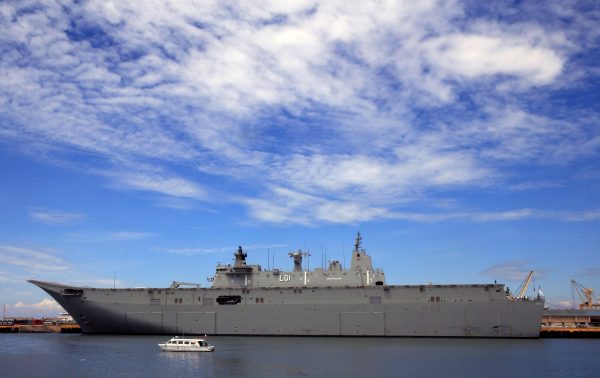These suggestions reduce a complex and messy situation into a simple ‘good and bad’ dichotomy with China cast as the ‘bad guy’. When the United States and other extra-regional countries characterise China in this way, they conveniently overlook the fact that by their standards, there are other ‘bad guys’ around the South China Sea. Cambodia, Indonesia, Malaysia, the Philippines, Thailand and Vietnam have all claimed restrictions on the freedoms of navigation not unlike those imposed by China.
More seriously, the suggestions overlook the interests of Southeast Asian states in the South China Sea. The sea is these countries’ backyard. It is not international waters. It comprises the EEZs of littoral countries, which have significant rights and duties in that water. Other nations operating in that space should do so with due regard to those rights and duties.
It’s simply not true to claim that most regional countries support FONOPs by non-littoral states. The phrase ‘freedom of navigation’ is a sensitive topic for some ASEAN states — they perceive other states are using the phrase to assert extensive freedoms that conflict with their own interests. Perceptions of law of the sea issues, particularly freedoms of navigation, vary widely both within Southeast Asia and between most ASEAN countries and extra-regional powers.
The top strategic priority in Asia and around the world today is to protect a global economic order that is under threat. This is a key concern of the Southeast Asian countries. Rocking the ‘strategic boat’ on a matter of complex legal principle makes little sense to them. Recent ASEAN forums have also alluded to the improving situation in the South China Sea. There is no desire to see operations that might cause instability.
The concept of freedom of navigation is a broad term. Supporting freedoms of navigation generally is not the same as supporting the particular FONOPs conducted by the US. A FONOP in the South China Sea can mean a lot of different things.
It can mean simply sailing through the sea — a right that is unchallenged by China despite allegations to the contrary.
It can mean a warship exercising the right of innocent passage by sailing within 12 nautical miles of a feature occupied by a country that requires prior notification of such a transit.
Or it can mean an aircraft flying or a warship sailing within 12 nautical miles of a low-tide elevation to demonstrate that the feature has no territorial sea and therefore high seas freedoms of navigation and overflight apply. The warship might demonstrate that this was the case by conducting operations contrary to the right of innocent passage, such as launching a helicopter or test-firing weapons.
There’s also a need to be careful with language in describing the situation in the South China Sea. It’s simply not true to say that Beijing claims almost all the South China Sea and islands within it as sovereign Chinese territory. It may claim all the features, but it only claims sovereign rights over resources of the sea. These rights are not to be confused with the sovereignty that a country exercises over its land territory and territorial sea.
It’s also misleading to claim that FONOPs in the South China Sea would support Australia’s interest in the freedom of the seas. This interest is a qualified one. Australia itself has supported new restrictions on the freedom of the seas in particular circumstances.
Assertions that Australia’s national interests lie in conducting FONOPs in the South China Sea are ill-founded. Australia often exaggerates its dependence on seaborne trade across the sea in order to claim a strategic interest. In reality it is China and Southeast Asian countries that would be most affected if trade across the South China Sea were disrupted.
Rather than being a demonstration of action against China to be welcomed by Australia’s regional neighbours, assertive FONOPs by Australia would not be welcomed by these countries, especially Indonesia.
Smooth relations with its near neighbours should always be a top priority for Australia. Support for a rules-based order of the seas is also an imprecise interest when there is no agreement on key points of international law related to particular freedoms of navigation.
The situation in the South China Sea is messy and complex. For Australia, the United Kingdom or France to conduct assertive FONOPs as a push-back against China would serve no useful purpose. Rather these operations could help destabilise a situation that is looking increasingly more stable. The operations would not be supported by most Southeast Asian countries. They would only add to the strategic distrust that continues to prevent effective management of the South China Sea and activities within it.
Sam Bateman is Professorial Research Fellow at the Australian National Centre for Ocean Resources and Security, University of Wollongong, and Advisor to the Maritime Security Programme at the S Rajaratnam School of International Studies, Nanyang Technological University.


As a national of a South East Asian country, I do not welcome military presence of any power outside the region. In our history, all external powers have invariably exercised coercive powers in their own interest, not in the interest of the peoples of the region.
China’s claim in the South China Seas can be resolved peacefully. Military coercion of any kind by third parties are unhelpful.